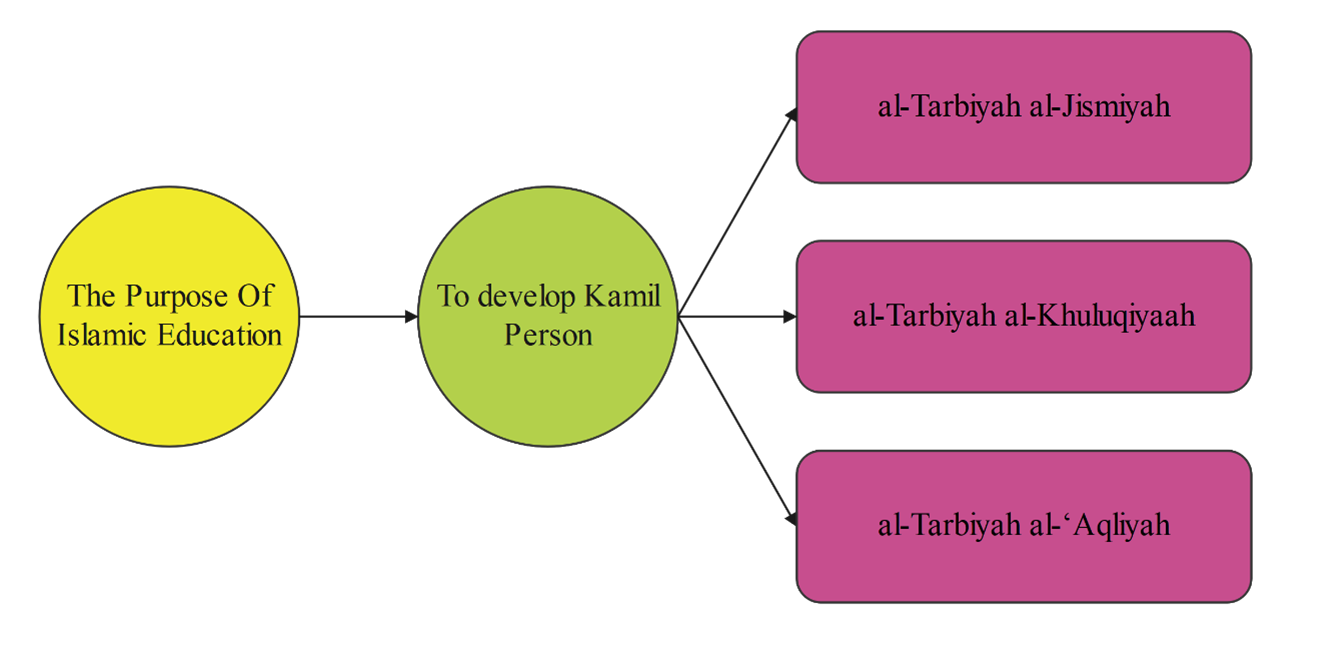Syed Muhammad Naquib al-Attas' Concept of Islamizing Science and its Relevance to Islamic Education
DOI:
https://doi.org/10.26555/almisbah.v10i2.6484Keywords:
Islamization of science, Islamic education, Naquib al-Attas, CurriculumAbstract
Islamic education has become less moral due to the religious and general science separation. This split in science is blamed on the West's secularization. Adding religious and general science to the Islamic education curriculum can solve this problem. This study aims to determine what Syed Muhammad Naquib Al Attas meant by Islamizing science and how it relates to Islamic education. This article uses qualitative descriptive research that blends history and philosophy. This study used Syed Muhammad Naquib Al Attas's books, other documents, books, and articles. According to Syed Muhammad Naquib al-Attas, the idea of Islamizing science is to free people from magical, mythological, animistic, cultural-national traditions that go against Islam, as well as from the chains of a secular understanding of thought and language and the control of their physical impulses that are often secular and unfair to their nature or soul. Islamic education develops the body, spirit, and mind (Insan Kamil). This research contributes to Islamic education by strengthening the epistemology of the Islamization of science and its relation to Islamic education.
References
Antoni, S. (2017). Dewesternisasi Pendidikan Islam (Studi Atas Pemikiran Sayyid Muhammad Naquib Al-Attas). 2(1), 36–48.
Arroisi, J., & Sari, N. (2020). Bahagia Prespektif Syed Naquib Al-Attas. Fikri : Jurnal Kajian Agama , Sosial Dan Budaya, 5(2), 184–196.
Damyati, A. R. (2015). Syed Muhammad Naquib Al-Attas dan Konsep Metafisik dalam Islam. El-Furqania : Jurnal Ushuluddin Dan Ilmu-Ilmu Keislaman, 1(01), 1–26. https://doi.org/10.54625/elfurqania.v1i01.874
Dewi, K., Aini, N., & Lazuardy, A. Q. (2020). Kritik Dualisme dalam Pendidikan Islam. Prosiding Konferensi Integrasi Interkoneksi Islam Dan Sains, 2, 307–312.
Ghoni, A. (2017). Pemikiran Pendidikan Naquib Al-Attas dalam Pendidikan Islam Kontemporer. Jurnal Lentera: Kajian Keagamaan, Keilmuan Dan Teknologi, 3(1), 196–211.
Hanifah, U. (2018). Islamisasi Ilmu Pengetahuan Kontemporer (Konsep Integrasi Keilmuan di Universitas-Universitas Islam Indonesia. TADRIS: Jurnal Pendidikan Islam, 13(2), 273–294. https://doi.org/10.19105/tjpi.v13i2.1972
Hidayat, W., Olifiansyah, M., Dzulfiqar, M., & Diaying, B. P. (2020). Kepemimpinan dalam Perspektif Islam. El-Hikmah, 14(1), 98–111.
Huringiin, N., & Azfathir, H. N. (2018). The Concept of Syed Muhammad Naquib al-Attas on De-Westernization and its Relevancy toward Islamization of Knowledge. Kalimah, 16(2), 265–284. https://doi.org/10.21111/klm.v16i2.2867
Khalwani, A. (2019). Relasi Agama dan Negara Dalam Pandangan Ibnu Khaldun. Resolusi: Jurnal Sosial Politik, 2(2), 107–120. https://doi.org/10.32699/resolusi.v2i2.993
Kosim, M., Kustati, M., & Murkilim, M. (2020). Syed Muhammad Naquib Al-Attas’ Ideas on the Islamization of Knowledge and Its Relevance With Islamic Education in Indonesia. MIQOT: Jurnal Ilmu-Ilmu Keislaman, 44(2), 250–267. https://doi.org/10.30821/miqot.v44i2.724
Muliati, I., & Rezi, M. (2017). Tujuan Pendidikan Dalam Lingkup Kajian Tafsir Tematik Pendidikan. ISLAM TRANSFORMATIF: Journal of Islamic Studies, 1(2), 177–190.
Musyrifin, Z. (2016). Pemikiran Nurcholis Madjid Tentang Pembaharuan Pendidikan Islam. Madaniyah, 2(XI), 315–326.
Muttaqien, G. . (2019). Pandangan Syed Muhammad Naquib Al-Attas tentang Islamisasi Ilmu. Jurnal Aqidah Dan Filsafat Islam, 4(2), 93–130.
Novayani, I. (2017). Islamisasi Ilmu Pengetahuan Menurut Pandangan Syed M. Naquib Al-Attas dan Implikasi terhadap Lembaga Pendidikan International Institute of Islamic Thought Civilization (Istac). Jurnal Al-Muta’aliyah, I(1), 74–89.
Saihu, S. (2020). Konsep Pembaharuan Pendidikan Islam Menurut Fazlurrahman. Andragogi: Jurnal Pendidikan Islam Dan Manajemen Pendidikan Islam, 2(1), 83–98. https://doi.org/10.36671/andragogi.v2i1.76
Sassi, K. (2018). Ta’Dib As a Concept of Islamic Education Purification: Study on the Thoughts of Syed Muhammad Naquib Al-Attas. Journal of Malay Islamic Studies, 2(1), 53–64. https://doi.org/10.19109/jmis.v2i1.2541
Sholichah, A. S. (2018). Teori-Teori Pendidikan dalam Islam. Jurnal Pendidikan Islam, 07(1), 23–46. https://doi.org/10.30868/EI.V7
Siregar, I. S., & Siregar, L. M. (2018). Studi Komparatif Pemikiran Ismail Raji Al-Faruqi Dan Syed Muhammad Naquib Al-Attas. Al-Hikmah: Jurnal Agama Dan Ilmu Pengetahuan, 15(1), 80–93. https://doi.org/10.25299/jaip.2018.vol15(1).1588
Sobry, M. (2013). REAKTUALISASI STRATEGI PENDIDIKAN ISLAM: IKHTIAR MENGIMBANGI PENDIDIKAN GLOBAL. Ulumuna: Jurnal Studi Keislaman, 17(2), 81–102.
Subaidi, S. (2016). Konsep Pendidikan Islam dengan Paradigma Humanis. Nadwa: Jurnal Pendidikan Islam, 10(1), 26–49. https://doi.org/10.21580/nw.2016.10.1.900
Ulum, M. (2020). Metodologi Studi Islam (Spiritualitas dalam Pendidikan Islam dalam Pandangan Syed Muhammad Naquib Al-Attas). Jurnal Keislaman Dan Kemasyarakatan, 4(1), 1–21.
Wiratama, A. (2011). Konsep Pendidikan Islam dan Tantangannya Menurut Syed Muhammad Naquib Al-Attas. At-Ta’dib, 5(1), 27–41. https://doi.org/10.21111/at-tadib.v5i1.582
ZA, T. (2014). Islamic Studies dalam Pendekatan Multidisipliner (Suatu Kajian Gradual Menuju Paradigma Global). Jurnal Ilmiah Peuradeun, 2(2), 211–234. https://doi.org/10.26811/peuradeun.v2i2.32

Downloads
Published
How to Cite
Issue
Section
License
Copyright (c) 2022 Eka Puspitasari , Anaas Tri Ridlo Dina Yuliana

This work is licensed under a Creative Commons Attribution-ShareAlike 4.0 International License.
Authors who publish with Al-Misbah agree to the following terms:
- Authors retain copyright and grant the journal right of first publication with the work simultaneously licensed under a Creative Commons Attribution License (CC BY-SA 4.0) that allows others to share the work with an acknowledgment of the work's authorship and initial publication in this journal.
- Authors are able to enter into separate, additional contractual arrangements for the non-exclusive distribution of the journal's published version of the work (e.g., post it to an institutional repository or publish it in a book), with an acknowledgment of its initial publication in this journal.
- Authors are permitted and encouraged to post their work online (e.g., in institutional repositories or on their website) prior to and during the submission process, as it can lead to productive exchanges, as well as earlier and greater citation of published work.

This work is licensed under a Creative Commons Attribution-ShareAlike 4.0 International License.



